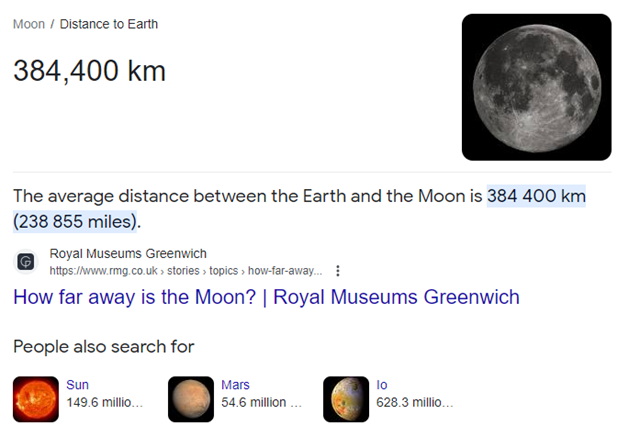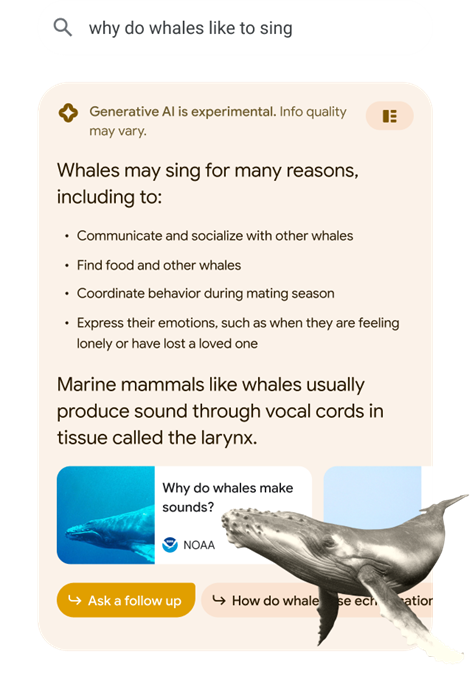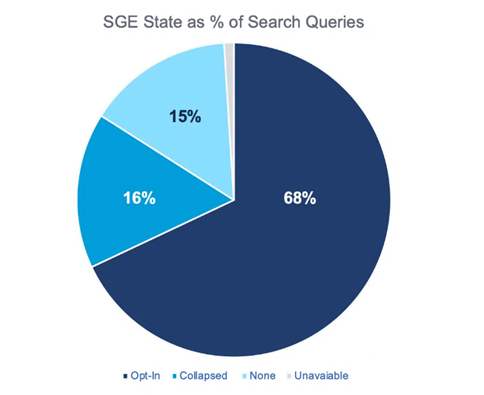With Search Generative Experience (SGE), Google is working on one of the largest changes to its search results to date. SGE aims to bring AI (artificial intelligence) to the forefront, delivering more detailed and more relevant search results to users.
Like with all new big updates, it all sounds a little scary. But there’s no need to panic - we’ve put together everything we know so far about SGE, so you can be prepared for SGE and how it could affect your website when it does launch.
Contents:
What is SGE?
SGE is an experimental search feature developed by Google. It provides users with concise overviews of search topics, generated by AI, reducing the need to sift through individual web pages for information. It’s not a new search engine, but Google’s search results will look very different.
It means that Google is able to bring together information from multiple sources to create answers to more complicated questions. Take this example from the current iteration of Google, where we have asked it, ‘How can I make chocolate chip cookies healthier?’.
The results for this query start with recipe cards. These require the user to click through to find the information that answers the specific query. The user may not be looking for a completely different recipe, but rather how they can make an existing recipe healthier.

This is followed by the People Also Ask section, which features related questions. Because each of these only pulls out information snippets from one web page, they tend to offer answers which are either complete or not what the user has asked for.

Underneath this, you get the organic search results, which again the users has to click into to look for the answer to their question.

Let’s look at how this query is answered using SGE.

The search results immediately look different - all of the main takeaways that answer the question have been taken from various web pages and turned into a more digestible format by the AI. SGE is one smart cookie!
Instead of needing to click into various results to get all of these different ideas individually, SGE helps the user skip several steps and presents a summarised answer directly in the search results. It then recommends web pages where the information was found, so users can look into the topic in more detail.
Taking featured snippets to the next level
You may have already seen something similar in the search results when you’ve put a simpler question into Google. Here we’ve asked Google ‘How far away is the moon?’.

Google currently serves up the answers to these kinds of questions in what’s called a featured snippet. The difference between this and SGE is that the answer is only taken from one source (in this case, Royal Museums Greenwich), it’s often not rewritten, and it’s only helpful for answering questions with more definitive answers. SGE therefore builds on the foundations laid by featured snippets, taking the answers a user can get directly within Google’s search results to the next level.
Follow-up questions continue the conversation in search
If you’re looking for more detail on an aspect of the answer generated by SGE, SGE handily has the option for users to ask follow-up questions right there where the answer is served.

This way, the interaction doesn’t just stop within the search results, or require the user to click into results to find out a more specific answer. They can simply type in another question which continues the conversation.
When is SGE being launched?
The good news is that whilst its already here there is still plenty of time to prepare for the full rollout of SGE. The experimental stage of SGE was due to end at the end of 2023, but in a January 2024 update, Google announced that SGE would remain in its test environment, Search Labs, for the foreseeable future. However, SGE elements are now slowly being integrated into search results.
Google is clear that this doesn’t mean SGE will never arrive on Google Search, as it's already happening right now. Instead, Google is continuing to develop the product in the background. It looks like SGE will only be launched once it is fully tested and the flaws in its generative AI have been ironed out.
In the meantime, certain users can access the beta version of SGE and use it while it’s still in these early stages.
How do I access Google SGE?
Google SGE can be activated via Google Search Labs, and once you’re opted in, it can be turned on to use whenever you’re searching in Chrome.
In order to opt into SGE, you need a Google account, and to be 18 or over. Ensure you’re logged into your Google account, and on the Google home screen, if SGE is available to you, the Labs icon (a beaker icon) will be visible in the top-right corner.

Image: Semrush
Go to ‘SGE, generative AI in Search’ and select the toggle which indicates that when turned on, SGE may appear when you search. It’s also worth noting that it may not appear for every search – some searches may still return the usual Google results.
Is SGE available in the UK?
Currently, SGE is not fully available in the UK, and Google has not yet announced plans as to when it will be ready to test in the UK.
It is currently available in over 120 countries and 7 languages – Google has published the full list of where SGE is available to test here, so you can check if it’s available in your country.
If you are in the UK and keen to test it out, the best way is to connect to a VPN, which can be set up to be based in one of the 120 countries that support SGE currently.
What are the benefits of SGE?
SGE works in a way which has the potential to massively improve the user experience within Google. Without having to even leave the search results, users can have the answers to their exact queries served up to them.
Serving up information in a bite-sized format
For some questions, there is a wealth of information and web pages out there to wade through. SGE harnesses the power of generative AI to bring users an easy-to-understand summary. Opportunities to pursue more information are served up in a user-friendly way too – either via the suggested follow-up questions, or via the sources referenced to inform Google’s answer.

Finding answers for specific questions or situations
With the old Google, you could ask a really specific question, but it’s unlikely you will find the exact answer straight away. Instead, you may need to visit a few different websites to form your own conclusions.
But with SGE, the AI forms the conclusions for you, putting the pieces together from various websites to bring you a concise, straightforward answer.

Finding out what other people think
Reviews and what other people have to say are so important to our decision making in this day and age, and SGE also brings those directly to the search results. UGC in SGE is a very new thing but it is useful for adding a more “human” element to the search results.

Instead of having to comb through multiple review websites, Google brings selected reviews to the search results, as well as a summary of what people generally think about the product or place.
Making the shopping experience quicker and easier
While Google Shopping has been a mainstay of Google for some time now, SGE takes it a step further, helping users to make a more informed decision on their purchase. It’ll suggest things to consider for certain situations, and make it easier to compare products and discover what they are best for.

How will SGE impact SEO and organic traffic?
While SGE seeks to vastly improve the user experience, the potential knock-on effect of bringing more information directly into Google’s search results is a lower amount of users clicking through to websites for their answers.
However, Google’s CEO himself, Sundar Pichai, emphasised the importance that the search engine will still place on the rest of the web. In an interview with Wired, he said: “It’s important to us to connect users with what’s out on the web, and we are working deeply to make sure that continues to work well”.
Until SGE launches as a default element of Google’s search, we cannot be certain how much of an impact it will have on organic traffic. The fact that SGE is continuing to evolve throughout its test period also makes it difficult to draw conclusions.
But several studies have been conducted which help us to paint a picture. BrightEdge conducted a study which shows that at the moment, an AI-generated answer is only shown straight away in SGE results 16% of the time. The vast majority (68%) of the time, the AI-generated answer needs to be requested by the user following their search.

With generative AI only recently exploding on the scene, Google may still be tentative about showing generative AI results by default, as 61% of people are wary of trusting AI systems, according to insights from KPMG. But it’s important to note that this could well change, as AI continues to improve and people get more used to AI being used in everyday life.
How often do website links appear in SGE results?
The main concern for website owners and businesses is that with more of the answer given in the search results, websites will see fewer clicks from organic search results.
But all is not lost here. Google does feature links to all of the pages it references in its SGE answers, and will continue to do so to address concerns over potential misinformation. The SGE answers feature, on average, 10 links from 4 unique domains or websites, according to a study by Authoritas. Some SGE results even show as many as 37 links in the SGE result above the typical organic listings.
And while the organic listings we’re all familiar with will still display on SGE, these don’t appear until around 1600 pixels down, so users will need to scroll quite far down to see these. With less visibility, the website clicks from these regular organic results are sure to decrease.
The impact on organic traffic
While there is visibility given to websites that inform SGE answers, the amount users actually click through to them is yet to be fully seen. For informative queries especially, SGE is likely to have some impact on organic traffic, as answers will be summarised in the search results.
However, there is an upside in that the traffic that does arrive on your website is more likely to engage. This is because they have been served the initial information through SGE, so when they do arrive on your website, they’re seeking more detailed information or to take the next step in the customer journey.
It’s also worth noting that so far, 94% of links featured in the SGE results are different to the organic listings, so there are opportunities to be had here. If you’re not currently ranking in the organic search results, but your website is featured in an SGE answer, you could see a net gain in organic traffic for queries that brought you nothing before.
In short, it’ll pay to be prepared for SGE, as this is where the majority of organic traffic will be up for grabs.
How do I optimise my website for Google SGE?
While the appearance of Google search may be dramatically changing in the future, SEO best practices for SGE remain largely the same as they always have: build a website that benefits your users. But with certain features becoming more prominent in the Google SGE results, there are some areas we recommend focusing on.
Create quality content that matches search intent
SGE’s answers will be fuelled by helpful, quality content, so it makes sense to ensure your website delivers this – not just for Google, but for your users too! Addressing the search intent ensures your content delivers what the user is looking for when they make that search.
One of the best ways to do this is to take your target keyword and look at the types of results that appear. What are the topics covered by the top results? And does the page serve to inform, help the user navigate a website, or purchase a product? This can inform how your page should be structured.
Keyword research will continue to be important for optimising content, but you should pay extra attention to more specific long-tail queries. People Also Ask in Google’s traditional search results, or the follow-up questions in SGE results, are a great place to look for more specific queries to address in your content. Here are some examples of specific queries users are asking about the Tower of London, which could be used to inform an attractions page or guide.

Your content should continue to follow other best practices – make sure it’s informative, well-researched and authoritative.
Set up schema markup
While Google is able to easily pull images and text to use in its search results, schema markup (also known as structured data) can help Google to pull in additional features which display in different formats. These can include reviews, news articles and author profiles. In the example below, you can see how schema markup has helped the star rating and review author to display as distinct features.

With more visual search results coming, as well as the increased reliance on generative AI to deliver the search results, schema markup helps make your website better understood by Google.
Image SEO
Make your images work harder with good image SEO. You could have an incredible infographic that delivers the perfect answer to a detailed question, but without optimising your image, Google may not even know it exists. Ensure your images have sensible file names, and that they include alt tags which describe the contents of the image.
Summary – What you need to know about SGE
Google's Search Generative Experience (SGE) will be a huge leap in AI-powered search, making it easier than ever for users to find answers by summarising insights from multiple sources directly within search results.
While still in its experimental phase without a set launch date, SGE offers a glimpse into a future where search queries bring concise, AI-generated overviews. This may reduce organic traffic as there is less need for users to navigate through individual web pages. But we could also see opportunities gained through more specific, long-tail queries, and those who do visit websites are more likely to convert.
It’s crucial to adapt your SEO strategy to remain visible in a changing digital and AI-driven landscape, with quality content, search intent, and structured data set to be the focus for many SEOs optimising for SGE.
Do you want to make sure your website is ready for Google SGE? That’s where our SEO agency can help. Get in touch today and find out how we can help your website to drive maximised results.